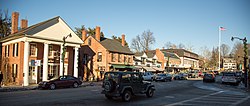
Back Concord, Massachusetts AF كونكورد (ماساتشوستس) Arabic كونكورد (ماساتشوستس) ARZ کونکورد، ماساچوست AZB Конкорд (Масачузетс) Bulgarian Concord (Massachusetts) Catalan Конкорд (Массачусетс) CE Concord (lungsod sa Tinipong Bansa, Massachusetts) CEB Concord (Massachusetts) Czech Concord, Massachusetts CY
Concord, Massachusetts | |
|---|---|
 View of Concord's Main Street, looking east toward Monument Square | |
| Motto(s): Quam Firma Res Concordia (Latin) "How Strong Is Harmony" | |
 Location in Middlesex County, Massachusetts | |
| Coordinates: 42°27′37″N 71°20′58″W / 42.46028°N 71.34944°W | |
| Country | |
| State | |
| County | Middlesex County |
| Settled | 1635 |
| Incorporated | September 12, 1635[1] |
| Founded by | Peter Bulkley and Simon Willard |
| Government | |
| • Type | Open town meeting |
| Area | |
• Total | 67.4 km2 (25.9 sq mi) |
| • Land | 64.5 km2 (24.9 sq mi) |
| • Water | 2.5 km2 (1.0 sq mi) |
| Elevation | 43 m (141 ft) |
| Population (2020) | |
• Total | 18,491 |
| • Density | 270/km2 (710/sq mi) |
| Time zone | UTC−5 (Eastern) |
| • Summer (DST) | UTC−4 (Eastern) |
| ZIP Code | 01742 |
| Area code | 351 / 978 |
| FIPS code | 25-15060 |
| GNIS feature ID | 0619398 |
| Website | www.concordma.gov |
Concord (/ˈkɒŋkərd/) is a town in Middlesex County, Massachusetts, United States. In the 2020 census, the town population was 18,491.[2] The United States Census Bureau considers Concord part of Greater Boston. The town center is near where the Concord and Assabet rivers join to form the Sudbury River.
The area that became the town of Concord was originally known as Musketaquid, an Algonquian word for "grassy plain." Concord was established in 1635 by a group of English settlers; by 1775, the population had grown to 1,400.[3] As dissension between colonists in North America and the British crown intensified, 700 troops were sent to confiscate militia ordnance stored at Concord on April 19, 1775.[4][5] The ensuing conflict, the battles of Lexington and Concord, were the incidents (including the shot heard round the world) that triggered the American Revolutionary War.
A rich literary community developed in Concord during the mid-19th century, centered around Ralph Waldo Emerson. Emerson's circle included Nathaniel Hawthorne, Louisa May Alcott and Henry David Thoreau. Major works written in Concord during this period include Alcott's novel Little Women, Emerson's essay Self-Reliance, and Thoreau's Walden and Civil Disobedience. In this era, the now-ubiquitous Concord grape was developed in Concord by Ephraim Wales Bull.
In the 20th century, Concord developed into an affluent Boston suburb and tourist destination, drawing visitors to the Old North Bridge, Orchard House and Walden Pond. The town retains its literary culture and is home to notable authors, including Doris Kearns Goodwin, Alan Lightman and Gregory Maguire. Concord is also notable for its progressive and environmentalist politics, becoming in 2012 the first community in the United States to ban single-serving PET bottles.
- ^ "History of Concord, Massachusetts". May 2, 2017.
- ^ "Census - Geography Profile: Concord town, Middlesex County, Massachusetts". United States Census Bureau. Retrieved October 27, 2021.
- ^ "History of Concord, Massachusetts". historyofmassachusetts.org. May 2, 2017. Retrieved October 16, 2018.
- ^ Fischer, p. 85
- ^ Chidsey, p. 6. This is the total size of Smith's force.



